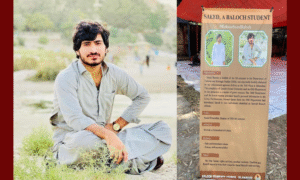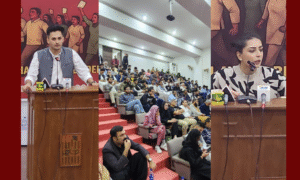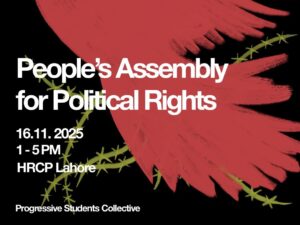by Fatima Shahzad
73 years after partition, Pakistan is still gripped by the conflict of creating an inclusive national identity, a fate it inherited given the ideology and conditions from which it came into existence. Time and again, we ask ourselves, is this what Quaid envisioned? Is this why millions died and were displaced? Without resorting to what Jinnah said in one speech or another, or offering a new interpretation of what Iqbal actually meant in a certain verse of any of poems, we still need to examine why there is this constant hostility towards religious and ethnic minorities, not only concerning individual biases and bigotry but systemic exclusion and discrimination.
The state inherited the colonial structure, only this time the ruling elite comprised of a civil-military bureaucracy, with no interest in combatting imperialism or serving the common people. With struggles to resist their hegemony, a major weapon against dissidents and political opponents became a national identity. Among those that did and continue to suffer most are minorities, those that did not fit into the narrow definition of ‘Pakistani’, which only grew narrower to the point where it means a Muslim, a Sunni, a Punjabi, and a conformist.
Hate crime against minorities is such a common occurrence that it’s impossible to follow the news without coming across a case of an Ahmadi or a Shia being gunned down on the streets, or an underage Christian, Sikh or Hindu girl being forcibly married to a much older Muslim man. Even with highlighted cases like these, it is safe to assume that such practices are much more widespread in reality and often go unreported. This reflects a legacy of exclusion and brutality those communities face, which results in the community leaders being reduced to having no influence, silenced when they raise these issues and threatened if they demand accountability.
The conditions most minorities live in cannot be understood without realizing how they are robbed of their political power and relevance. The first step is to label their movements “anti-state”. This is done to reinforce the conception among the general populace of the minority being “the other”, making it easier to alienate and crack down on those that speak up. An example of this is how Pakistani Hindus are conflated with being Indian, and thus the enemy. Members of the Ahmadi community are decried as infidels. Whether educated from elite institutions and more than qualified, you can still be denied a job, as Atif Mian was, or a more extreme example is of a 65-year-old small pharmaceutical shop owner in Attock who was shot and killed.
Secondly, minorities are economically deprived, mostly only getting to work in low paying jobs under terrible conditions. There are hardly any resources invested in their communities, which can also be said for the provinces. This is most obvious in the case of Balochistan, as it is hardly given a fair share of resources compared to how much is extracted from it. The recent issue with the cuts to education and online classes and the lack of countrywide access to the internet are only a few examples of the dismissive attitude the state adopts towards the difficulties faced by students belonging disproportionately to an ethnic minority.
The discourse on the subject is also infuriating with justifications for discrimination such as telling people to look at Modi or Trump as if being slightly better than fascists is a good metric of whether local minorities are given their rights and considered equals. Similar acts are committed here but ignored, movements calling for justice are repressed, activists and organizers are imprisoned, abducted and killed. It often seems that the state narrative perpetuated by those that benefit by dividing to rule over and exploit all of us tends to win. There has been a rise in awareness over such issues internationally in the wake of the BLM movement but we fail when it comes to introspection. A sincere struggle against oppressors is thus impossible without the participation of religious and ethnic minorities.
The Students’ Herald News Desk focuses on reporting the latest news regarding student politics and campus updates to you.
The News Desk can be reached at admin@thestudentsherald.com




